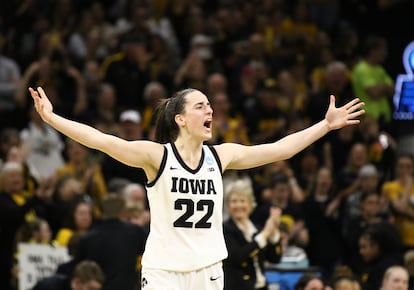‘She is the Taylor Swift of basketball’: How Caitlin Clark became a pop phenomenon
At only 22 years old, the Iowa Hawkeyes player has captivated the United States with her unusual talent and charisma. After breaking all the statistical records, brands and politicians are lining up for her endorsement

She has broken all the records there were to break for points, assists and successful three-pointers scored, but you have to look beyond mere statistics to fully understand her impact. For example: her games garner audience figures never seen before on television, growing up to 60% on average in a year. Tickets to see one of her impossible shots live courtside can cost over $3,000. Before signing her first professional contract, she has already pocketed $3 million in sponsorship deals alone, with multinationals such as Nike, Gatorade, or Bose fighting to have her wear their sneakers, drink their isotonic drinks or use their wireless headphones. Her jersey, bearing the number 22, is out of stock in stores, traditionally non-sports media publish reports on her achievements and her hordes of fans already have an official name, Clarkies, like the Swifties. And the comparison with Taylor Swift is not trivial, because the fever she has awakened in the United States over the past year is only comparable to that generated by the singer. Caitlin Clark is the star of an unusual cultural phenomenon: a student at the University of Iowa, 22 years old and 5′9″ feet (180 centimeters) tall, she has managed to take basketball — and women’s sports — to the greatest heights in its history.
Nike’s ad of Caitlin Clark shooting to the other side of the street is too hard! 🔥🔥 pic.twitter.com/Mft9jmDMKO
— Nice Kicks (@nicekicks) March 4, 2024
“Caitlin Clark is making me — an avowed hater of team sports — appreciate women’s basketball for the first time.” This headline, by journalist Emma Specter in the American edition of Vogue magazine, perfectly sums up the supernova sensation exuded by a young woman who is unabashed on the court but discreet off it. Clark — “Kobe Bryant with pigtails” — is the event of the year, the woman in vogue, the must-see photo on the Instagram reel and the unmissable appointment to attend in order to claim to be up-to-date with the latest trends, even if you don’t know what a free throw is. Not even two consecutive losses in the NCAA league finals manage to diminish the excitement around Clark, which transcends the court. “I’ll be able to sleep every night even though I never won a national championship. I don’t sit and sulk about the things that never happened. And, you know, I think I’m so hungry for a lot more, too,” she said after her final game in Iowa, her home state.
@cbssports Only Caitlin Clark can do that #iowa #caitlinclark #ncaabasketball
♬ original sound - CBS Sports
Born into a sports family — both her father and a brother were also college athletes — Clark has a talent for basketball so precocious that she was already a standout in her hometown of Des Moines at the age of five. However, due to a lack of women’s competitions, her father signed her up for the men’s league, where she had to play against boys bigger and stronger than her — and parents angered by the presence of a girl on the court — while displaying an unusual competitive ferocity. That same charisma, coupled with her once-in-a-generation skills, has ensured that 17 years later her trademark ponytail has captivated an entire country, despite the fact that she rarely gives interviews or smiles gratuitously for the cameras.
“The uncompromising attitude makes her an unusual kind of role model. She upends the pressure commonly put upon female athletes to project a sweet and endlessly positive image,” says Louisa Thomas in The New Yorker. For Clark, and for the buoyant business around her, that public image has brought only joy. Each of her home games has set new records in ticket sales, and WNBA teams are rubbing their hands together in anticipation of the player’s imminent arrival in the competition after concluding her college career. The effect, already coined as “Clarkonomics,” has caused a spike in the number of season tickets sold among WNBA teams for next season.
Caitlin Clark Canonized As Saint After Performing Miracle Of Making Women's Basketball Watchable https://t.co/SeHIJiy3L1 pic.twitter.com/DtNZ2H4RkJ
— The Babylon Bee (@TheBabylonBee) April 6, 2024
“When you factor in the outsized impact she’s having off the court, there’s really been only one other player like her: Michael Jordan,” wrote journalist Nancy Armour in USA Today, while Forbes reiterates the similarity between Clark and Swift: “Like Swift’s impact on the music industry, college women’s basketball has never seen numbers like Clark’s [...] Both are taking their industries to a whole new level.”
The game that cemented Clarkmania took place on April 1. Iowa’s game against LSU in the quarterfinals of the NCAA playoffs became the most-watched game in the history of college basketball — men’s and women’s — with more than 12 million viewers on average. This figure surpasses that of the finals of global competitions including baseball, ice hockey or even the all-powerful NBA. The ratings bonanza based on Clark’s three-pointers is such that it is already playing an important role in the course of the U.S. electoral campaign.
As confirmed by the specialized media Politico, President Joe Biden himself is trying to “jump on her bandwagon” by placing campaign commercials during broadcasts of her games in an attempt to win over a significant demographic: “Women’s basketball typically draws a younger and more female audience than other sports,” Politico notes. Defeated Republican candidates Nikki Haley and Ron DeSantis also tried unsuccessfully to associate their names with Clark to beat Donald Trump in the primaries, and a not-so-subtle fight is expected to secure her media support in the run-up to the polls. If Taylor Swift’s support is already considered one of the most important sources of mobilization when it comes to potentially deciding the election result, will Caitlin Clark and her Clarkies also have a decisive influence?
Sign up for our weekly newsletter to get more English-language news coverage from EL PAÍS USA Edition
Tu suscripción se está usando en otro dispositivo
¿Quieres añadir otro usuario a tu suscripción?
Si continúas leyendo en este dispositivo, no se podrá leer en el otro.
FlechaTu suscripción se está usando en otro dispositivo y solo puedes acceder a EL PAÍS desde un dispositivo a la vez.
Si quieres compartir tu cuenta, cambia tu suscripción a la modalidad Premium, así podrás añadir otro usuario. Cada uno accederá con su propia cuenta de email, lo que os permitirá personalizar vuestra experiencia en EL PAÍS.
¿Tienes una suscripción de empresa? Accede aquí para contratar más cuentas.
En el caso de no saber quién está usando tu cuenta, te recomendamos cambiar tu contraseña aquí.
Si decides continuar compartiendo tu cuenta, este mensaje se mostrará en tu dispositivo y en el de la otra persona que está usando tu cuenta de forma indefinida, afectando a tu experiencia de lectura. Puedes consultar aquí los términos y condiciones de la suscripción digital.









































